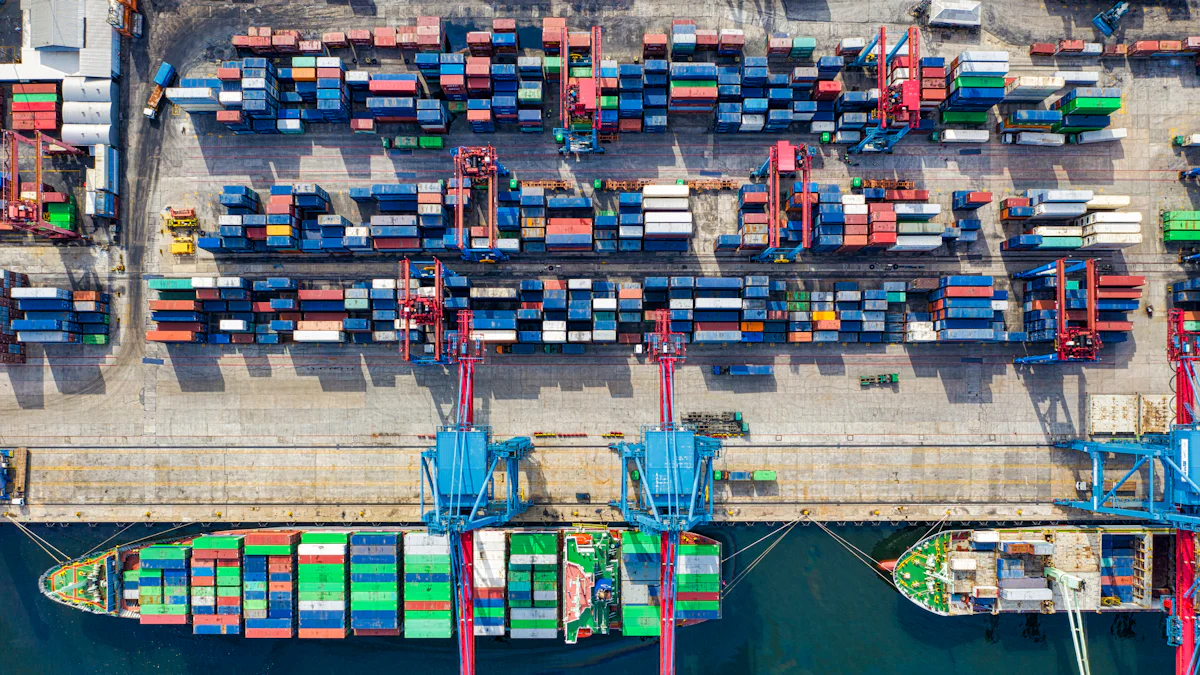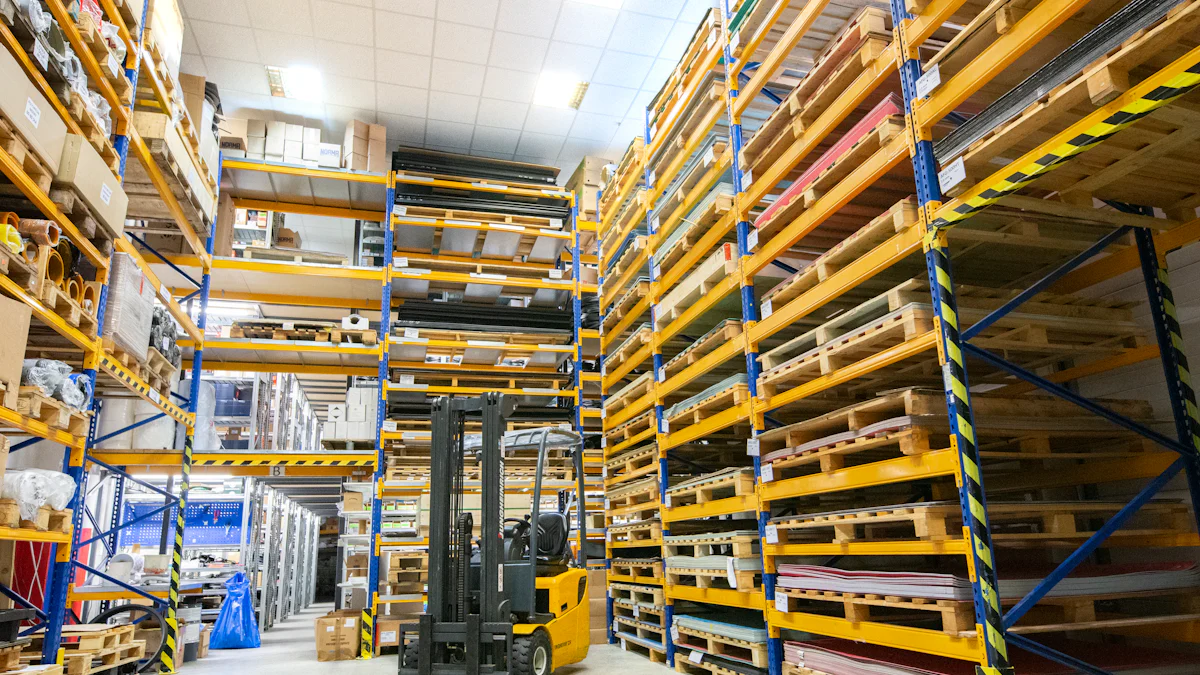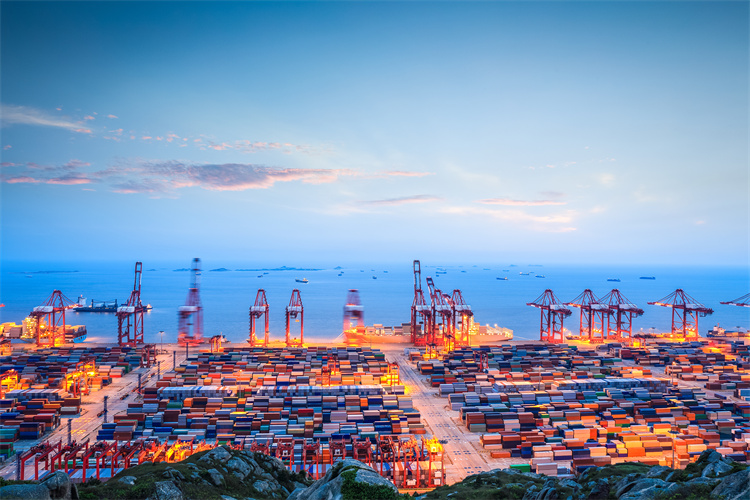The Future of Logistics: How Digital Technologies Are Reshaping Global Supply Chains

The logistics industry is experiencing a profound transformation. Technology plays a pivotal role in this revolution. Companies worldwide are digitalizing logistics operations. This shift enhances efficiency and reduces reliance on traditional practices. Over 90% of organizations have adopted or plan to implement new technology in logistics. The market size of digital logistics reached USD 33.5 billion in 2023. A projected 20% CAGR between 2024 and 2032 underscores the sector's growth. Digital Transformation is crucial for modern logistics, reshaping global supply chains and driving future advancements.
The Current Challenges in Global Supply Chains
Complexity and Fragmentation
Diverse Stakeholders
Global supply chains involve a multitude of stakeholders, each with distinct roles and responsibilities. Manufacturers, suppliers, logistics providers, and retailers form an intricate network. Each entity operates with unique objectives and priorities. This diversity often leads to communication gaps and misalignments. These issues can result in inefficiencies and increased operational costs. Effective collaboration among stakeholders is essential for optimizing supply chain performance.
Geographical Disparities
Geographical disparities present significant challenges in global supply chains. Different regions exhibit varying levels of infrastructure development and regulatory environments. These disparities affect transportation efficiency and cost-effectiveness. For instance, advanced regions may offer robust logistics networks, while others may lack essential infrastructure. Companies must navigate these differences to ensure timely delivery and maintain service quality. Strategic planning and investment in infrastructure improvements can mitigate these challenges.
Inefficiencies and Delays
Bottlenecks in Transportation
Transportation bottlenecks remain a persistent issue in logistics. Congested ports, limited transportation routes, and regulatory constraints contribute to delays. These bottlenecks disrupt the flow of goods and increase lead times. Companies invest in digital logistics solutions to address these challenges. Automation and data-driven route optimization enhance transportation efficiency. These technologies reduce fuel costs and minimize carbon emissions, contributing to sustainability goals.
Inventory Management Issues
Inventory management poses another challenge in global supply chains. Inaccurate demand forecasting and inefficient inventory practices lead to stockouts or overstock situations. These issues impact customer satisfaction and revenue. Digital transformation offers solutions through predictive analytics and artificial intelligence. These technologies optimize inventory levels and improve demand forecasting accuracy. Companies leveraging these tools experience enhanced operational performance and cost savings.
Digital Transformation in Logistics

Key Digital Technologies Transforming Logistics
Internet of Things (IoT)
The Internet of Things (IoT) revolutionizes logistics by providing real-time tracking and monitoring capabilities. Companies use IoT devices to collect data from various points in the supply chain. This data enables businesses to optimize routes and improve inventory management. Real-time insights enhance operational efficiency and reduce costs. IoT technology also improves customer satisfaction by ensuring timely deliveries. The integration of IoT into logistics operations streamlines supply chains and increases productivity.
Artificial Intelligence and Machine Learning
Artificial Intelligence (AI) and Machine Learning (ML) play a crucial role in logistics Digital Transformation. AI algorithms forecast demand and optimize route planning. These technologies improve inventory management and enhance decision-making processes. AI reduces logistics costs by 15% and optimizes inventory levels by 35%. Enhanced service levels result in increased customer satisfaction. AI empowers strategic decision-making and surpasses manual analytics. The integration of AI into logistics operations enhances operational efficiency and automates decision-making processes.
Blockchain Technology
Blockchain technology offers significant benefits in logistics Digital Transformation. Companies use blockchain to enhance security and prevent counterfeit products. This technology improves efficiency and reduces costs in logistics operations. Blockchain provides transparency and traceability across the supply chain. Companies benefit from enhanced security and reduced risk of fraud. The adoption of blockchain technology in logistics ensures data integrity and fosters trust among stakeholders. Blockchain technology plays a vital role in reshaping global supply chains.
Case Studies and Examples
Successful Implementation of IoT
JUSDA's Real-time Tracking Solutions
JUSDA Supply Chain Management International Co., Ltd. has successfully implemented IoT technologies to revolutionize logistics operations. The company utilizes real-time tracking solutions to monitor shipments across global supply chains. IoT devices collect data from various points, providing comprehensive visibility into logistics processes. This approach enhances operational efficiency by reducing delays and optimizing routes.
Real-time tracking solutions enable JUSDA to offer precise delivery estimates. Customers benefit from accurate information about shipment status, improving overall satisfaction. The integration of IoT into logistics operations streamlines processes and increases productivity. JUSDA's commitment to innovation underscores the transformative power of Digital Transformation in logistics.
Impact on Efficiency and Customer Satisfaction
The impact of IoT implementation on efficiency and customer satisfaction is profound. JUSDA's real-time tracking solutions reduce lead times and enhance delivery accuracy. The company achieves significant cost savings through optimized transportation routes. IoT technology minimizes fuel consumption and carbon emissions, aligning with sustainability goals.
Customer satisfaction improves as a result of timely deliveries and transparent communication. JUSDA's clients experience enhanced service quality and reliability. The successful implementation of IoT exemplifies the potential of Digital Transformation in reshaping global supply chains. JUSDA sets a benchmark for leveraging digital technologies to achieve operational excellence.
AI in Supply Chain Management
JUSDA's AI-driven Demand Forecasting
JUSDA employs AI-driven demand forecasting to optimize supply chain management. The company uses advanced algorithms to predict customer demand accurately. AI technology analyzes historical data and market trends to generate precise forecasts. This approach enables JUSDA to maintain optimal inventory levels and reduce stockouts.
AI-driven demand forecasting enhances decision-making processes by providing actionable insights. JUSDA's supply chain operations benefit from improved resource allocation and reduced waste. The integration of AI into logistics operations exemplifies the transformative impact of Digital Transformation. JUSDA's innovative approach demonstrates the potential of AI in revolutionizing supply chain management.
Improved Accuracy and Reduced Costs
The implementation of AI-driven demand forecasting results in improved accuracy and reduced costs. JUSDA achieves significant cost savings through optimized inventory management. The company reduces excess inventory and minimizes carrying costs. AI technology enhances operational efficiency by streamlining supply chain processes.
Improved accuracy in demand forecasting leads to better customer service and satisfaction. JUSDA's clients benefit from timely product availability and reduced lead times. The company's commitment to Digital Transformation drives continuous improvement in supply chain management. JUSDA's success story highlights the potential of AI in reshaping global logistics.

JUSDA Solutions
To provide you with professional solutions and quotations.
Benefits and Implications of Digital Transformation
Increased Efficiency and Cost Reduction
Streamlined Operations
Digital transformation in logistics results in streamlined operations. Companies utilize advanced technologies to automate processes. Automation reduces manual intervention and minimizes human errors. Efficient systems enhance productivity and operational efficiency. Logistics companies achieve faster processing times and improved accuracy. The integration of digital tools optimizes resource allocation and workflow management.
Reduced Waste
Digital transformation significantly reduces waste in logistics operations. Companies employ data analytics to monitor and optimize inventory levels. Predictive analytics prevent overstocking and stockouts. Efficient inventory management minimizes excess inventory and associated costs. Companies reduce waste by optimizing transportation routes and schedules. Sustainable practices align with environmental goals and regulatory requirements.
Improved Customer Satisfaction
Faster Delivery Times
Digital transformation enhances delivery speed in logistics. Companies leverage real-time tracking and route optimization technologies. These tools enable precise delivery estimates and timely shipments. Customers experience reduced waiting times and increased reliability. Efficient logistics operations contribute to customer satisfaction and loyalty. Companies gain a competitive edge by meeting customer expectations for fast deliveries.
Enhanced Service Quality
Digital transformation improves service quality in logistics. Companies use advanced technologies to enhance communication and transparency. Real-time updates provide customers with accurate shipment information. Enhanced visibility fosters trust and confidence in logistics services. Companies deliver superior service quality through efficient operations and proactive communication. Customers benefit from reliable and seamless logistics experiences.
Survey Results:
67% of shipping and logistic companies have a formal digital transformation strategy.
Companies report significant improvements in efficiency and customer satisfaction.
Digital transformation drives cost reduction and enhances service quality.
Future Directions and Trends

Emerging Technologies
Autonomous Vehicles
Autonomous vehicles are reshaping logistics operations. These vehicles use advanced sensors and AI-driven systems. Companies see potential in self-driving trucks for freight transportation. Autonomous technology reduces labor costs and increases safety. Efficiency improves with reduced human intervention. Logistics firms invest in autonomous vehicles for scalability. The industry anticipates significant changes in delivery methods.
Drone Deliveries
Drone deliveries offer exciting possibilities for logistics. Drones provide faster and more cost-effective solutions. Companies use drones for last-mile delivery operations. These devices reduce carbon emissions compared to traditional methods. Logistics firms benefit from improved delivery speed and flexibility. Drones enhance operational efficiency and customer satisfaction. The logistics sector embraces drone technology for future growth.
Sustainability and Green Logistics
Eco-friendly Practices
Eco-friendly practices gain importance in logistics. Companies adopt sustainable methods to reduce environmental impact. Efficient transportation routes minimize fuel consumption. Logistics firms implement green warehousing solutions. Renewable energy sources power logistics facilities. Sustainable packaging reduces waste in supply chains. Eco-friendly initiatives align with corporate social responsibility goals.
Regulatory Compliance
Regulatory compliance plays a crucial role in logistics. Governments enforce environmental regulations on logistics operations. Companies adhere to emission standards and waste management policies. Compliance ensures smooth operations and avoids legal penalties. Logistics firms invest in technologies to meet regulatory requirements. Sustainable practices help companies achieve compliance goals. Regulatory adherence enhances brand reputation in the market.
Digital technologies have revolutionized logistics, transforming operations and enhancing efficiency. Companies now leverage automation and data analytics to modernize systems and improve customer experiences. The future of logistics will see unparalleled efficiency and reliability through the integration of these technologies. Industry stakeholders must embrace digital transformation to meet current demands and ensure long-term success. The shift towards automation reduces operational costs and minimizes manual work. This transformation positions logistics companies for sustained growth and competitiveness in a rapidly evolving market.
See Also
Paving the Way: Tomorrow's Logistics Through Digital Innovation
Virtual Replicas: Tomorrow's Supply Chain Management
Artificial Intelligence in Logistics: Transforming Future Operations
Transforming Transportation: Supply Chain Innovation's Influence
